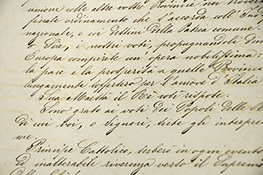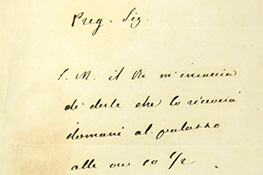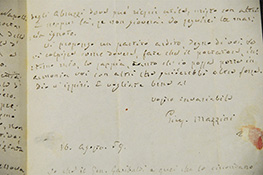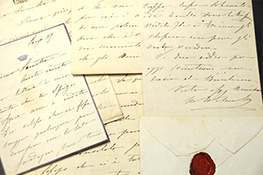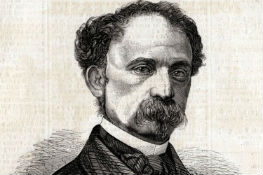Versione italiana English version Version française Versión en español
Another interesting piece of the historical mosaic of the Resurgence, reconstructed from documents in possession of the library of Palazzo Cisterna, is represented by the archive of the general count Leonetto Cipriani. Not a prominent figure at the time, but present in some nerve junctions of the wars of independence, he was born in Centuri, Corsica, in 1812 and died there in 1888, after having led a dynamic and adventurous existence, of which he left testimony in the memoirs Avventure della mia vita, published by Zanichelli in 1934.
Entrepreneur, military and finally senator of the Kingdom, after having followed the French army to Algiers, he took part in the first war of independence fighting at Curtatone and Novara. During the Second War of Independence he became a member of the headquarters of Napoleon III, and in 1859 participated in the process of annexation of the Central Italian states, as general governor of Romagna (between the papers, the dispatch with which the Romagne Assembly's Deputation asks the annexation, with the answer of the king). The most interesting documents come from the year 1848 (when Cipriani was extraordinary commissioner in Livorno and tried to stifle the revolt of democratic circles, earning the title of "tiger race") and those relating to 1859 (when, in his capacity as governor general, he took care to take repressive measures against Mazzini's conspirators).
He was also consul of the Sardinian kingdom in California in the early 50s, and it's interesting the correspondence in that period with the major Alessandro Garbi, for the costume notes.
Among the cards we point out some autograph letters of well-known personalities of the time, Cavour and Mazzini, and also of the famous Countess Maria Walewska.
Historical and biographical notes
Leonetto Cipriani was born in Ortinola, a hamlet of Centuri, Corsica, on 16th May 1812, from Matthew and Catherine Caraccioli. The father, turned Bonapartist, the fall of the Empire, moved to Livorno which became the center of its various merchant ventures; and here the family joined him in 1822.
In 1824 C. was sent, together with his brother Peter, to the college of St. Catherine in Pisa, where remained for four years, proving to be a little docile pupil. After leaving school, his father entrusted the supervision of the Tuscan possessions and his business correspondence. In 1830, preparing the French expedition to Algeria C. obtained from his father the permission of participate, under the protection of the godfather, General Juchereau de Saint-Denis, Deputy General Staff; and remained in Algiers even after the departure of the general, recalled to France by the July Revolution. According to what he wrote in his memoirs (Avventure della mia vita, a. edited by L. Mordini; Bologna 1934, pp. 40-51), he would return to Tuscany, under parental pressure, but in the company of a very young woman, perhaps of Genovese origin, who had belonged to the harem of the bey. The short adventure ended tragically with the suicide of the young woman. Overcome this serious crisis, the C. was sent by his father to Trinidad, in the Antilles, where the family had substantial possessions and interests. Here he devoted much of his time to Antilles and the continent; he also crossed parts of the United States, visiting Washington, Baltimore and New York. In '34 he returned to Europe; and, after a short stay in Paris, in Belgium and the Netherlands, was again in Livorno. These years also date the first reports with the Bonaparte family (linked to the Cipriani by business ties) and, above all, with the former king of Westphalia, Jerome.
In November 1834 the Cipriani moved to Pisa, where the C. enrolled in the university, to study the natural sciences. After only one year of studies, to the news of the emancipation of slaves in the English colonies, his father sent him to London for clarify the financial and financial situation of their American possessions, in consequence of the new anti-slavery legislation. From London the C. continued for Trinidad; and here, after settling the various legal and patrimonial issues. he devoted himself with profit to various merchant activities in the Antilles. He returned to Livorno only in '36, stopping, some time in Paris, where he had his first contacts with Italian political emigration. In '37, at the death of his father, he accepted the protection of his younger brothers. The consistency household property was always quite conspicuous, because, in addition to the various activities economic in the Antilles, the Cyprians had agricultural possessions and landed property in Tuscany and Corsica. But, being involved in numerous lawsuits, C. had to sell the Pisan palace and proceed to severe economies. In these years had, precisely, various relationships of a legal nature with some young lawyers, destined then to have a notable part in Tuscan political events, such as the Montanelli, the Guerrazzi and the Salvagnoli. Meanwhile the ties with the Bonaparte had become increasingly stronger; according to what he writes in his memoirs, C. had become intimate, as well as the former king Jerome and the son, also of the former king of Holland, Louis, of the former king of Spain, Joseph, and of the former queen of Naples, Carolina Murat; and he was often their adviser in delicate negotiations economic. Instead, it was always kept away from the different radical and republican groups, active in Italy, during the forties.
On the contrary, his brother Alexander, in his frequent business trips to France and Malta, he had approached some of Mazzini’s emigration, especially to Nicola Fabrizi, with whom he kept a thick correspondence.
In 1943 Mazzini, determined to resume the initiative, had arranged to recruit some revolutionaries in Corsica, ready to land in Tuscany, to promote an insurrection in the Romagne. Alessandro had undertaken to provide the conspirators, arrived in Livorno, the means necessary for the shipment which, according to a police informer Austrian, infiltrated in the Giovine Italy, perhaps came, to a considerable extent, just from the Bonaparte. However, a considerable sum had been promised personally also by Alexander.
According to the narrative of C. (which, however, clearly diverges from the news provided by the Protocol and some letters from Mazzini), in August, while Alessandro, with the wife Sofia Parra, was in Paris, showed up in Livorno only four conspirators, led by Nicola Fabrizi’s brother, Paolo. These asked C. the grant promised by Alexander: after complicated and harsh negotiations (in which he took part also the Montanelli), the C. poured a considerable sum that allowed the conspirators to away from Livorno. Of course it is that, if, until then, the C. had kept away from movement mazziniano, from this moment he became a decisive opponent of Mazzini and of his followers, which he also held. Responsible for having provoked, with their recriminations and accusations, the death of Alexander, which occurred shortly after, in Paris, moreover for natural causes.
Elected Pope Pio IX, C. went to Rome to personally realize the new political possibilities. There he managed to approach some high ecclesiastical dignitaries, including the cardinals Luigi Amat and Angelo Mai, to whom he attributed, in his memoirs, statements the reform of ecclesiastical institutions. After having reported in person to Carlo Alberto the result of such talks, moreover rather generic, the C. went to Corsica, waiting for more decisive political developments. He returned, however, immediately in Tuscany, at the beginning of the First War of Independence; and, in Florence, he tried to convince the minister Ridolfi so that he immediately sent livornesi volunteers in Lunigiana. He himself joined the expedition, without any rank or official assignment; but, rich in inventiveness and gifted of a solid practical sense, soon became indispensable to give a minimum of order and efficiency to those disorganized and heterogeneous troops.
After the formal declaration of war of Tuscany to Austria, the Tuscan volunteers joined the regular troops in Reggio Emilia, under the command of Colonel De Laugier which will give C. the rank of captain. When De Laugier replaced General Ferrari from Grado in command of all the Tuscan troops, he became its aide-de-camp. In this quality, participated in the fight of Curtatone and was later given the Knight’s cross of St. Joseph and the honourable mention Sardinian. After the battle of Goito, the De Laugier, mistakenly believing he is facing a corps of troops the Austrians now en route, sent the C. to order them to surrender, but without providing him with due credentials. So the C., who arrived at the Austrian lines, was taken prisoner and, accused of being a spy, was led to the headquarters of the Radetzky. These had him locked up in the fortress of Mantova where he was subjected to a harsh imprisonment. He released by the personal intervention of Charles Albert, former King Jerome, Lord Palmerston and the Sardinian Minister of War. Left at liberty under the commitment not to take more part in the war (from which, however, he was then released by the Radetzky for intercession of De Laugier), the C. returned to Livorno, where he was joined by the news of the defeat of Custoza and the armistice.
Meanwhile, in Tuscany, the news of the Sardinian military showers had caused the fall ael ministry Ridolfi. In his memoirs C. writes that, while the surveys among the leading exponents of the Tuscan political world to form a new government, the Salvagnoli and Lambruschini, which should have been part of it together with Ricasoli, they invited him to take up the War Ministry; but the invitation he rejected outright.
When this project fell, the Capponi government was formed, whose life was immediately very difficult, also for the revolutionary situation that had been created in Livorno, the center of the opposition democratic. The discontent that had long been rife in the city exploded at the end of August, with a popular uprising, which ended with the dissolution of the Civic Guard, while the democrats remained practically masters of the city.
To restore order to Livorno, the government appointed the C., promoted for the occasion colonel, extraordinary commissioner with full powers. He arrived in Livorno on the evening of August 30 and his decision and energy seemed to restore calm in the city. The following day he issued a "Notification", in which he appealed to civil concord.
Nevertheless, to prevent any resumption of the agitation, he ordered the return of the weapons, which had been taken from the military depots and the civic guard, and forbade the meetings of the democratic Circle of the People. These reckless decisions provoked the reaction of the
The European Parliament has a duty to ensure that the European Parliament is fully involved in this process. The C. tried to operate, numerous arrests; but, noticed the weakness and the indecision of its troops, it had to give up.
He decided to withdraw the garrison to the fortress. One of his dispatches to the government to obtain permission to bomb the city was intercepted by the insurgents; the troops under his command proved completely incapable of coping with the serious situation; so, while the armed pressure of the Democrats increased, C. was forced to abandon Livorno, retreating to Pisa. Presented to the government a report on his work (but on, own activity in those days also wrote a pamphlet: Narration of the facts that you report to my mission as extraordinary commissioner in the city of Livorno, Florence, 1848), retired to his villa in Montalto.
When the democratic agitation spread to the rest of Tuscany, C. was sent by the government first to Turin to ask Carlo Alberto for the intervention of his troops and, then, in Paris, in charge of an official mission to deal with the purchase of material war.
After the advent of the democratic government Guerrazzi-Montanelli, he was immediately recalled to Tuscany; he responded by giving up his mission, and remained in the French capital.
Here his relations with the Bonaparte family and with Alexander Walewsky, Napoleon’s son, became even closer; and he often attended meetings held in the house of the former King Jerome to prepare the candidacy of a Bonaparte for the presidency of the French Republic. During this period C. had, of course, also various meetings with the future president and then emperor, Louis Napoleon.
In March 1849 C. returned to Italy and participated in the second campaign, against Austria with the Sardinian army, as attaché to the Bes Division Staff. He fought at the Sforzesca and Novara; later, for his behavior, he was awarded the silver medal.
After the Grand Ducal Restoration in Tuscany, C. resigned as colonel and withdrew to his possessions, going, restless, from archaeological research in his lands of Cecina, to the exploration of the islands of Montecristo and Pianosa where perhaps he intended to live, until he decided to take the road to the Americas. Appointed Sardinian consul in San Francisco (10th Sept. 1850), after settling his affairs, he began the journey at the end of the August of 1851.
He first went to Paris, where the then President Louis Napoleon invited him to stop, offering him various employment opportunities under his command. But his impatient nature spurred him to depart; and C. left the capital, where, however, at every relations with Italian emigrants. In this regard, his memories are rich in notes and interesting memories, such as the mention of a visit by Mazzini to the former king Gerolamo, the presence of the Montanelli in the entourage of Napoleon III, and his duel, for private reasons, with the livornese democrat Vincenzo Malenchini.
The American continent did not offer the C. the great economic opportunities in which it had hoped. His financial transactions for the purchase of land in California or for the cattle trade (he once crossed most of the United States from Saint Louis to California, leading a large herd) doesn’t seem that they had very positive results, although they satisfied his restlessness and his desire to always make new experiences. However, in 1955, when the Crimean War was underway, he returned to Europe and remained there until 1958. His activity, during this three-year period, very varied and intense, confirms his close ties with the Bonaparte family and his participation in the complex political and diplomatic activity that prepared the French intervention in Italy.
In '55 he was, in fact, in Turin, where he met with Vittorio Emanuele II on the eve of his trip to France; and he formally asked the king, on behalf of the former king Gerolamo, the Duchess of Genoa for Prince Gerolamo Napoleon; but the negotiations failed because the Duchess refused. Between June and October 1956 he accompanied the prince himself on his journey to Iceland. Then, in 1957, armed with credit letters from Walewski, Gualterio and Matteucci, he carried out an unofficial mission in the Romagne, as is also evident from the correspondence Minghetti-Pasolini and from the Memorie of Minghetti himself. On that occasion he established relations with some important politicians of Romagna, also in relation to the note that Napoleon III intended to send to Pioc IX, to urge reforms in the Church State.
The following year he conducted the first negotiations for the marriage of the same Gerolamo Napoleone with the, Princess Clotilde of Savoy, daughter of Vittorio Emanuele; this time too, however, the reticence of the courtrooms induced him to abandon the mission. He therefore returned to San Francisco; but already in October 1958, Gerolamo Napoleone urged him to be in Europe, at the latest in the spring of the following armo, also in view of his marriage to Princess Clotilde and the subsequent developments of the Franco-Sardinian alliance.
Aware of the political significance of that union, the C. decided to leave as soon as possible. In New York he was joined by the news of the European Congress which was to decide, through diplomatic means, the Italian question. He stayed, so, still in the United States and, in those days, he married a young American, Mary Worthington. However, on 22nd June 1959 the C. was in Piedmont and, appointed Colonel of the Staff of the Sardinian army, was assigned to the headquarters of Emperor Napoleon III.
It seems - as Gaspare Finali wrote later - that he too participated in the preliminaries of the armistice of Villafranca and that, On that occasion, he was aware of the error that led the French representatives to attribute to Austria also the Cispadan districts of the province of Mantua.
His close connection with the emperor was certainly the main reason for the offer that he was made to assume the office of governor of the Romagne, after the withdrawal of the Piedmontese commissioner, Massimo d'Azeglio. C. accepted; but, before going to Bologna, stopped in Florence. Rubieri states that, during his presence in the Tuscan capital, he tried to probe political circles about the possible return of the Lorraine dynasty, according to what had been established by the armistice, but that, realizing that the cause of the Lorraine was now lost, he loyally informed the French government of the impossibility of a restoration. These statements are not confirmed by other sources, while G. De Reiset (Mes souvenirs, III, L'unité de l'Italie et l'unité de l'Allemagne, Paris 1901, who insists on the status of a French subject of C. and its links with Walewsky), states that, although aware of the opposition of the citizens of Romagne to the Papal government, the governor was quite willing to follow the directives of the emperor and did not aim at the total abolition of papal sovereignty. However, it is a fact that C. wanted to agree with his friend Ricasoli a plan of common action, both for what concerned the internal order and for the defense against possible attacks.
Elected governor by the Council of State of the Romagne on 1st August , C. took office on 6th August. By the 28th he convened the colleges for the election of an Assembly which met for the first time on the 1st of September. On the 6th the elected deputies proclaimed the decay of the temporal power and the will of the Romagne to join the Savoy monarchy. In addition, the Assembly ratified the acts of the provisional government and the appointment of the C. to governor with full powers.
During his governorship, the Military League between the States of Central Italy was established on 10th August. The negotiations for the formation of the league were very laborious, especially for the attitude of Ricasoli who feared to tie the fate of Tuscany to those, much more uncertain, of the Romagne. However, the serious problem was overcome, with the stipulation, first, of a treaty between Tuscany and the provinces of Emilia and then with the subsequent accession of the Romagne who became part of the league, without conditions. The command general of the army of the league was entrusted to general Fanti, while Garibaldi, already placed at the head of the Tuscan army, was second in command.
In carrying out his functions of government, C., a man of increasingly moderate opinions, implacable opponent of Mazzini, and Mazzini and fearful of making acts that could displease Napoleon III and provoke his intervention, He showed, all the limits of his authoritarian character and his lacklustre political abilities. Suffice it to recall here the arrest of Alberto Mario, his wife Jessie White and Rosolino Pilo, his attempt to convince Ricasoli to arrest and instruct in Romagna, with a deception, the same Mazzini, then present in Florence (and C. declared that he would have him shot immediately!), and the uncertain policy followed towards the neighboring territories of the Marche still in papal hands, determined, on the one hand, by its decisive anticlericalism, The European Union is also aware of its deep aversion to Austria and, on the other hand, its fear of the reactions of France and the other European powers to the possible encroachment of volunteers from Romagna. The Brofferio, who was then in the Romagne with the office of unofficial observer attributed to him by Rattazzi, was very critical of these attitudes and decisions.
However, as governor, C. also took important economic measures for the reorganization of the provinces of Romagna, in the context of the complex and difficult general political situation of central Italy.
In this regard, the Decree of 22nd August, which addressed the problem of excise duty and provided for a reduction in tariffs, the provisions of 27th August and 27th September on mortgage taxes, the decree of 16th September recognizing the papal public debt, the appointment of a commission for the amortization of the national loan. The essential problems, however, were always constituted by the threat of the restoration of papal power, the uncertainty of the personal policy of Napoleon III, the relations not always easy with the other governments of the States of the league and, especially, from the weakness of the La Marmora-Rattazzi government, unable to take decisive initiatives diplomatic and military. To face such difficulties, C. was certainly not the most suitable man, both for the suspicion of being a Bonapartist agent who discredited him in the eyes of public opinion, not only in Romagna, and for his lack of flexibility in character.
Nevertheless, in addressing the thorny question of the regency of the prince of Carignan that troubled the governments of central Italy in September, C. had the merit of unblocking a stagnant situation, even if his work, at that moment more than ever, could lend himself to accusations of Bonapartism.
The idea of the union of the four States of central Italy had already been mooted in the aftermath of the formation of the military league; and it was particularly, albeit for different reasons, supported by both the autonomists and the Bonapartists, and found favour with Farini and Cipriani himself. The latter, informed by Emanuele Marliani, sent to London by the government of the Romagne, that the English government was in favour of the idea of the union of the four States, sent to Florence the same Marliani who, previously, had agreed with the Cavour and the British Minister in Turin, Sir James Hudson, on the appointment of the Carignan as regent. In Florence, Count Pasolini from Romagna also moved along the same line. It’s also known the opposition to this project by Ricasoli, always afraid that the formation of a single State of central Italy could, in reality, favor the aims of Prince Gerolamo Napoleon or, in any case, make the union with Piedmont more difficult. C. persisted in his line and proposed to his Tuscan colleague a meeting that took place, on 28th September, at Scanello, near Loiano, on the road of the Filigare, in the presence also of Minghetti, Farini and Audinot, to discuss the regency and other problems concerning the unification of the central states with each other and with the Sardinian kingdom. Ricasoli decided to accept the proposal of the regency, provided that it was based on separate decisions by the individual assemblies.
Concurrently they proceeded the negotiations for the abolition of the customs barriers not only between the States of central Italy, as they would have wished the C. and Farini, but also between them and Piedmont, as Ricasoli wished. On 3rd October, in Florence, in Palazzo Vecchio, the customs league was stipulated. Meanwhile, by a decree dated 1st October, C. established the legal tender of the Sardinian lira in the Romagne and, shortly after, proceeded the unification of weights and measures with those in force in the Sardinian kingdom.
In the second half of October the crisis matured that led to the end of the Cipriani governorate. The immediate reason was the serious clashes with the Fanti and Garibaldi for the project, which they prepared for an armed expedition in the Marche. In fact, the presence of C. in Bologna had never been liked by the democrats and, finally, became increasingly unpopular and suspicious even to the moderates who had also requested his appointment. Nor, of course, had he improved his relations with the political leaders of Bologna the attitude he held towards Gaspare Finali, his chief of staff and trusted man of Minghetti, that C. kept in the dark about all his decisions and initiatives. When the consignment in Marche seemed imminent, the governor who, too, had first assumed a fairly favorable position, fearing now that the action of Garibaldi and the troops of the league provoked a harsh Napoleonic reaction, promoted a sudden meeting with the Ricasoli, without informing the Farini.
The meeting (attended by Celestino Bianchi, Finali, Vincenzo Ricasoli and General Raffaele Cadorna, recently Minister of the War of Tuscany) took place in Pratolino on 28th October; and the two politicians even divided the possible dissolution of the military league and the volunteer corps. This provoked a serious crisis also in the relationships between the C. and the Farini; crisis in which, as is known, it intervened directly the same Vittorio Emanuele who invited Garibaldi to renounce: to his command and to the project of intervention in the Marche. In any case, the position of C. had now become unsustainable; so that, as soon as the Assembly of Romagne had voted the regency of the Carignan (7th November), he hastened to resign, aware that he no longer had the confidence of his former supporters.
Extremely embittered, C. retired from public life; he obtained, as the only reward, a letter from Vittorio Emanuele (29th Apr. 1860) thanking him for his services to the Italian cause. Shortly after these events, at the news that his wife had died in giving birth to his son, C. left for the United States, stopping first in Paris, where he assisted the former King Jerome in the imminence of his death on 24th June 1860. He remained in America, engaging in economic activities not always lucky, until 1864, when he returned to Italy at the invitation of his cousin Ubaldino Peruzzi. Perhaps the imminence of the September Convention and a resumption of the unitary political initiative made its presence in the country useful, as a possible unofficial intermediary with the Napoleonic circles. It is a fact that on 8th October, 1865 he was appointed senator and, in August 1866, knight of the Grand Cross of SS. Maurice and Lazarus was an honorary general; he was also given the title of count. And he must have maintained a certain political influence if, in the summer of '66, Gabrio Casati, then president of the Senate, turned to him for having news of the most important events of those days, such as the investigation of Admiral Persano, the negotiations with Vienna and the possibility that the armistice of Cormons would turn into a definitive peace.
At the end of '66, following a business dispute with his brother Giuseppe that gave rise to a long judicial dispute, the C. ripartiva per gli Stati Uniti, where he remained until the year '68 and where he returned again in '71 to be able to personally follow the course of his economic interests that had become very precarious. The following year he retired permanently to Centuri, leaving only for short trips to Tuscany and Roffia. From this moment on, he devoted himself almost exclusively to the administration of his the heritage and education of the children of the second marriage with Maria Napoleoni.
He only rarely attended the Senate sessions, but he was always attentive to Italian affairs, as shown by the publication in Rome, in 1872, of his pamphlet On the rehabilitation and colonization of the Agro Romano.
This project, already elaborated during the last American stay, is of great interest for the proposed solution based on experiences already implemented in California. But more than the technical aspects of the proposal is concerned with C.’s assessment of the type of government in the United States, the initiative of the American people and the suggestion to create around the capital a band of small landowners who would exercise a function of social conservation and productive activity.
In 1882 he again lent his work to Prince Gerolamo Napoleone, going to Chambéry and Moncalieri to define, with King Umberto himself, the question of the dowry of Princess Clotilde. And probably dates back to '83 another short written Memory in defense of his rights on the Chapel of Our Lady of Sorrows in the Convent of ss. Annunziata. in Corsica, published in Florence.
By now the Italian and European political situation pushed him more and more to isolation in his castle of Belvedere in Centuri. For a man so bound, by tradition familiar and personal choice to the Bonaparte, the fall of the Second Empire had represented the collapse of his deepest and most entrenched ideals; just as he was indignant and shocked by the triple and anti-French attitude of the new Italian foreign policy. He therefore ended his life with a very significant gesture repeatedly recalled by the Finals in his Memorie: a clause of his will required the heir, his son Alessandro, to renounce his Italian citizenship, precisely because of the alliance that Italy had contracted with Austria, the object of his inflexible aversion for many years.
C. died in Centuri on 10th May 1888. Shortly before, anticipating his own death, he had asked the President of the Senate that his commemoration be limited to reading the letter of Vittorio Emanuele who implicitly denied those suspicions that had always accompanied his political activity.
- Archive inventory (pdf 211 KB)

